Abstract
Human CD21 has previously been described as a receptor for the C3d,g and iC3b proteins of complement, as a receptor for the gp350/220 envelope glycoprotein of the Epstein-Barr virus (EBV) and also as a receptor for inerferon-alpha (IFN-alpha). Structurally, CD21 consists of 15 to 16 short consensus repeats (SCR) of 60 to 75 amino acids followed by a transmembrane domain and an intracytoplasmic region. We reported that CD23, a low-affinity receptor for IgE (Fc epsilon R2), is a new functional ligand for CD21. We recently found that the sites of interaction of CD23 on CD21 are on SCR 5 to 8 and 1-2. The first site is a lectin-sugar type of interaction and the second site is a protein-protein interaction. We report here that amongst the other ligands for CD21 (EBV, C3d,g and IFN-alpha), only EBV is able to inhibit the binding of CD23 to CD21. Furthermore, even a peptide from gp350/220 of EBV known to bind to CD21 is able to decrease CD23 binding to CD21. Since CD23/CD21 pairing is important in the control of IgE production, we tested the effect of the EBV-derived peptide on immunoglobulin production from peripheral blood mononuclear cells and purified tonsillar B cells. Interestingly, the EBV-peptide inhibited IgE and IgG4 production induced by interleukin-4, in a dose-dependent manner. The same results were obtained using either peripheral blood mononuclear cells or purified tonsillar B cells. Another CD21 ligand, C3, did not affect binding of CD23 to CD21 nor the production of IgE and IgG4. This study indicates that blocking CD23 binding to CD21 SCR 2 on human B cells selectively modulates immunoglobulin production.
Full text
PDF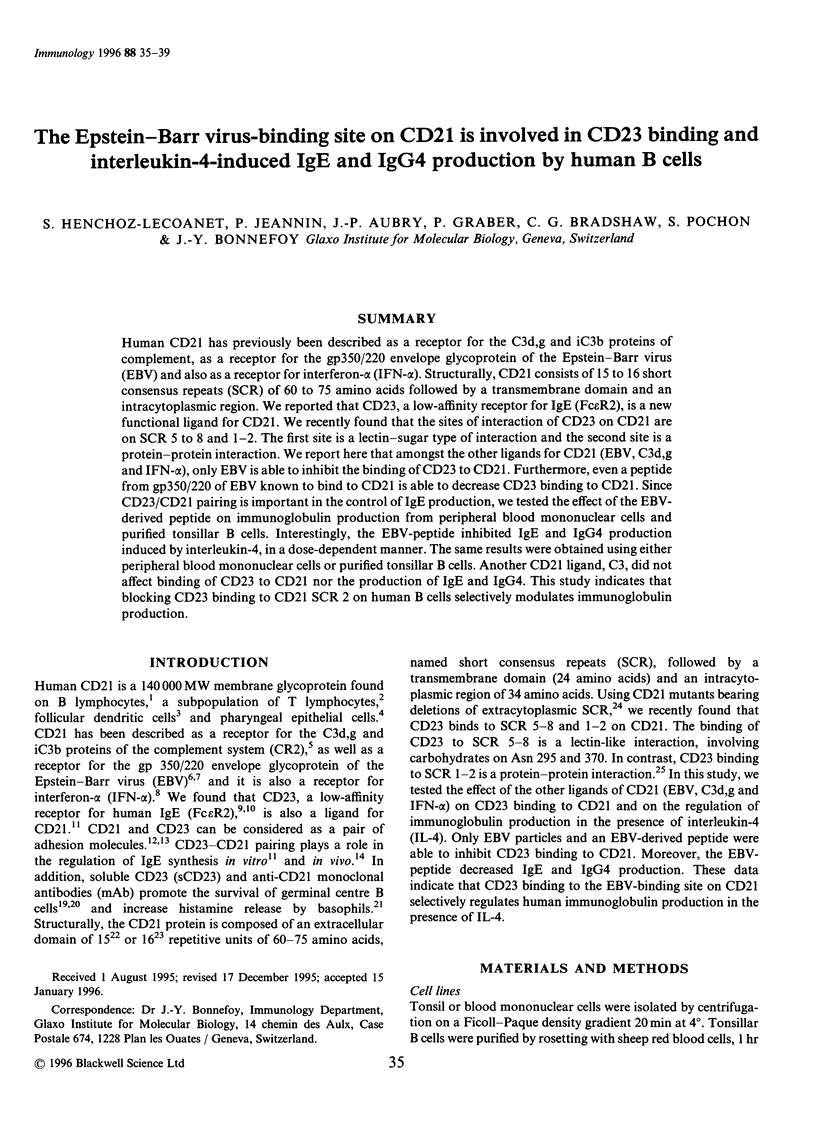
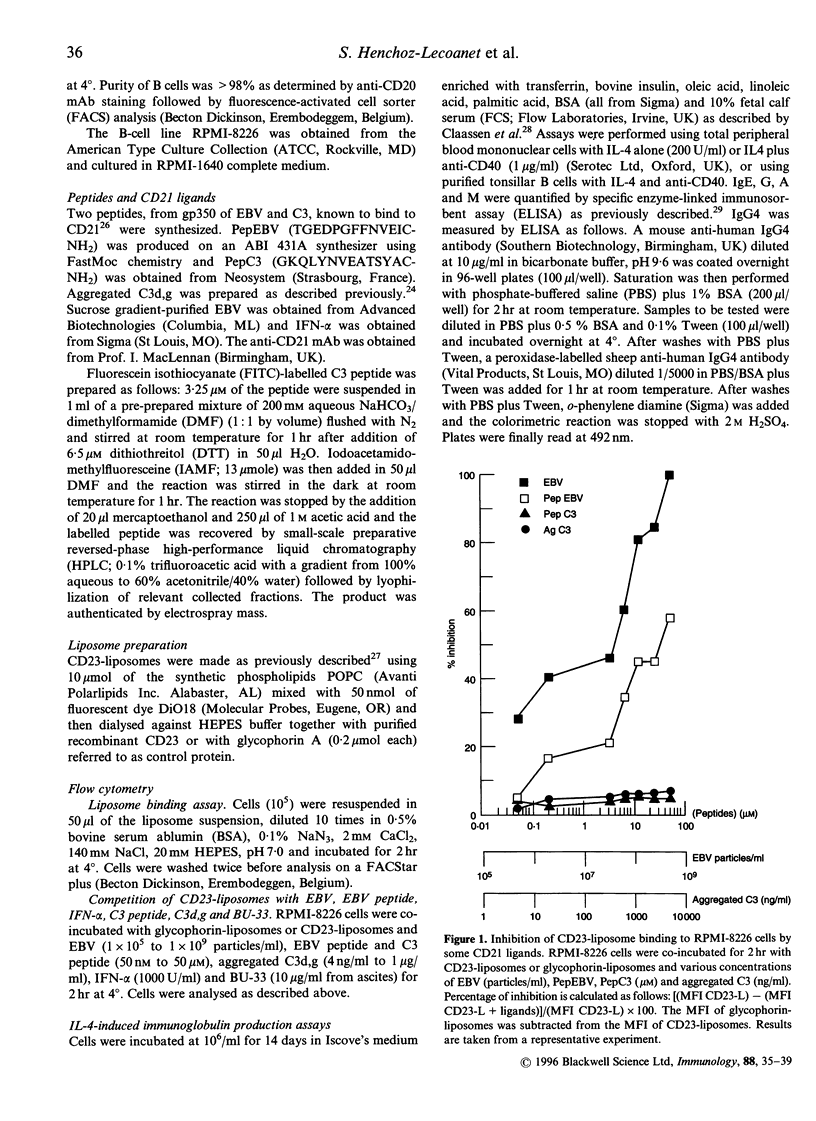
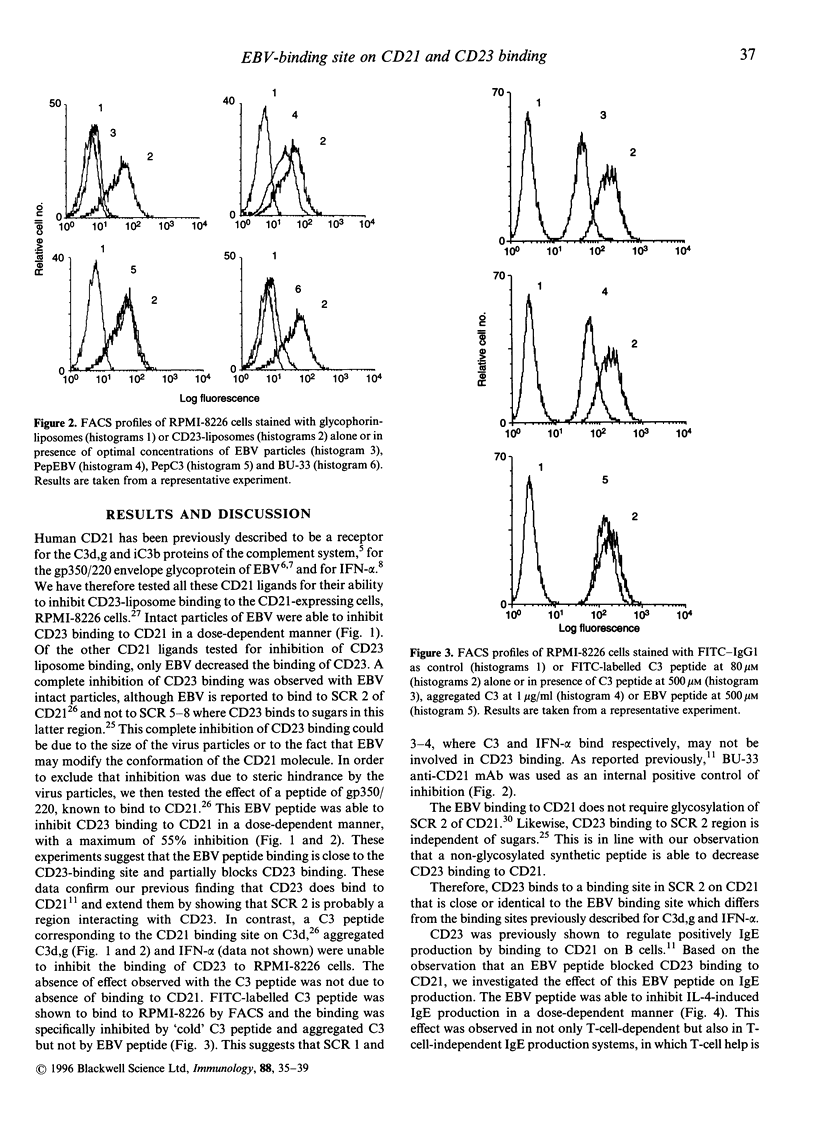
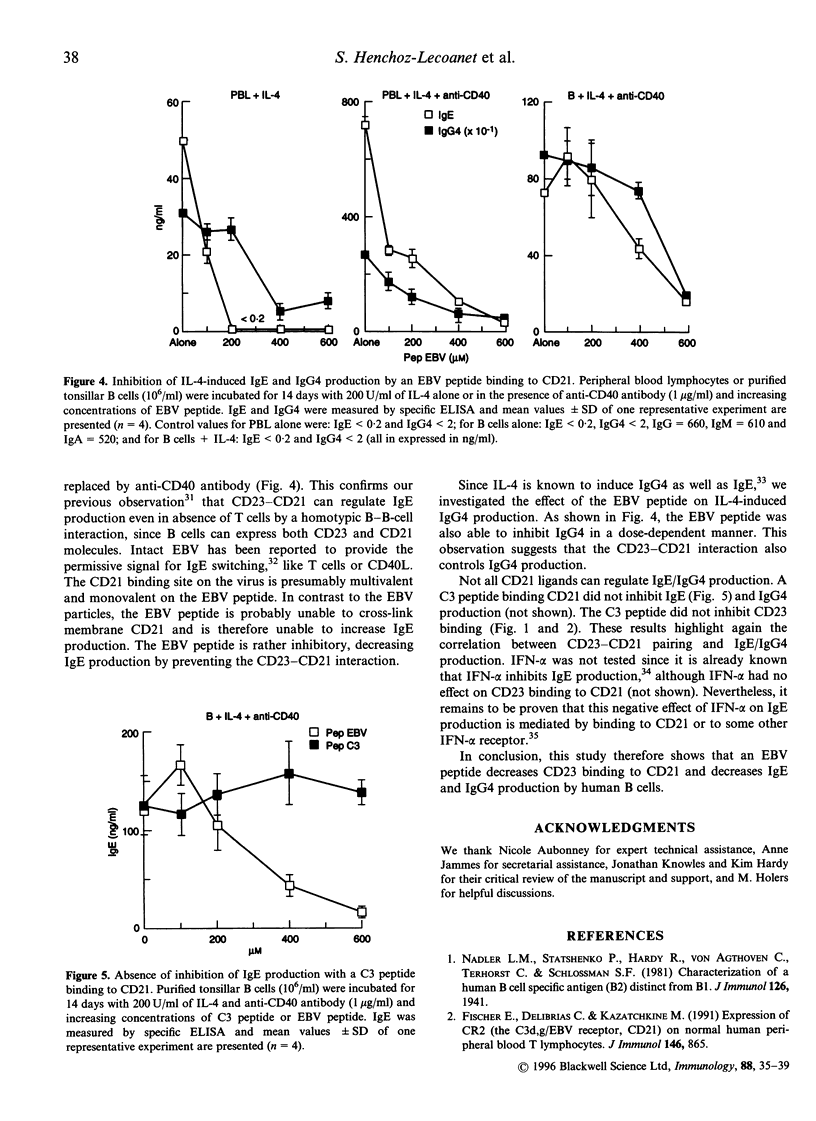
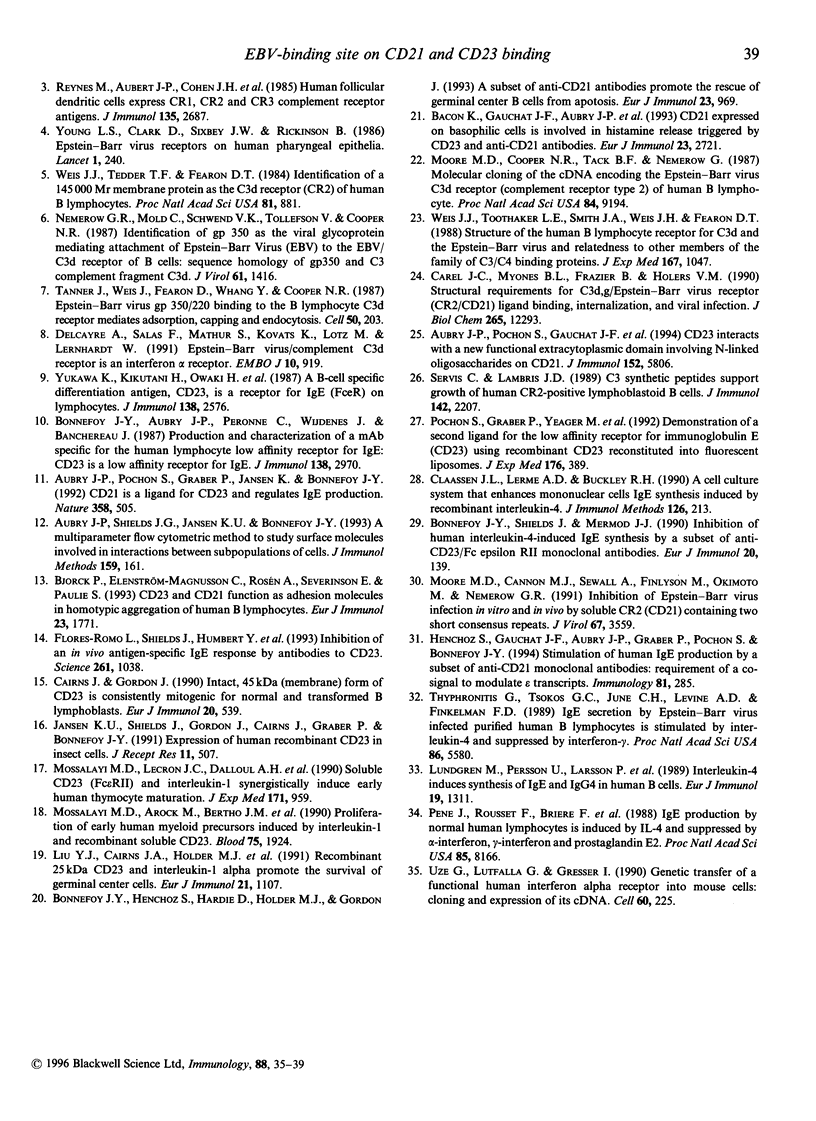
Selected References
These references are in PubMed. This may not be the complete list of references from this article.
- Aubry J. P., Pochon S., Gauchat J. F., Nueda-Marin A., Holers V. M., Graber P., Siegfried C., Bonnefoy J. Y. CD23 interacts with a new functional extracytoplasmic domain involving N-linked oligosaccharides on CD21. J Immunol. 1994 Jun 15;152(12):5806–5813. [PubMed] [Google Scholar]
- Aubry J. P., Pochon S., Graber P., Jansen K. U., Bonnefoy J. Y. CD21 is a ligand for CD23 and regulates IgE production. Nature. 1992 Aug 6;358(6386):505–507. doi: 10.1038/358505a0. [DOI] [PubMed] [Google Scholar]
- Aubry J. P., Shields J. G., Jansen K. U., Bonnefoy J. Y. A multiparameter flow cytometric method to study surface molecules involved in interactions between subpopulations of cells. J Immunol Methods. 1993 Feb 26;159(1-2):161–171. doi: 10.1016/0022-1759(93)90154-y. [DOI] [PubMed] [Google Scholar]
- Bacon K., Gauchat J. F., Aubry J. P., Pochon S., Graber P., Henchoz S., Bonnefoy J. Y. CD21 expressed on basophilic cells is involved in histamine release triggered by CD23 and anti-CD21 antibodies. Eur J Immunol. 1993 Oct;23(10):2721–2724. doi: 10.1002/eji.1830231054. [DOI] [PubMed] [Google Scholar]
- Björck P., Elenström-Magnusson C., Rosén A., Severinson E., Paulie S. CD23 and CD21 function as adhesion molecules in homotypic aggregation of human B lymphocytes. Eur J Immunol. 1993 Aug;23(8):1771–1775. doi: 10.1002/eji.1830230806. [DOI] [PubMed] [Google Scholar]
- Bonnefoy J. Y., Aubry J. P., Peronne C., Wijdenes J., Banchereau J. Production and characterization of a monoclonal antibody specific for the human lymphocyte low affinity receptor for IgE: CD 23 is a low affinity receptor for IgE. J Immunol. 1987 May 1;138(9):2970–2978. [PubMed] [Google Scholar]
- Bonnefoy J. Y., Henchoz S., Hardie D., Holder M. J., Gordon J. A subset of anti-CD21 antibodies promote the rescue of germinal center B cells from apoptosis. Eur J Immunol. 1993 Apr;23(4):969–972. doi: 10.1002/eji.1830230432. [DOI] [PubMed] [Google Scholar]
- Bonnefoy J. Y., Shields J., Mermod J. J. Inhibition of human interleukin 4-induced IgE synthesis by a subset of anti-CD23/Fc epsilon RII monoclonal antibodies. Eur J Immunol. 1990 Jan;20(1):139–144. doi: 10.1002/eji.1830200120. [DOI] [PubMed] [Google Scholar]
- Cairns J. A., Gordon J. Intact, 45-kDa (membrane) form of CD23 is consistently mitogenic for normal and transformed B lymphoblasts. Eur J Immunol. 1990 Mar;20(3):539–543. doi: 10.1002/eji.1830200312. [DOI] [PubMed] [Google Scholar]
- Carel J. C., Myones B. L., Frazier B., Holers V. M. Structural requirements for C3d,g/Epstein-Barr virus receptor (CR2/CD21) ligand binding, internalization, and viral infection. J Biol Chem. 1990 Jul 25;265(21):12293–12299. [PubMed] [Google Scholar]
- Claassen J. L., Levine A. D., Buckley R. H. A cell culture system that enhances mononuclear cell IgE synthesis induced by recombinant human interleukin-4. J Immunol Methods. 1990 Feb 9;126(2):213–222. doi: 10.1016/0022-1759(90)90153-m. [DOI] [PubMed] [Google Scholar]
- Delcayre A. X., Salas F., Mathur S., Kovats K., Lotz M., Lernhardt W. Epstein Barr virus/complement C3d receptor is an interferon alpha receptor. EMBO J. 1991 Apr;10(4):919–926. doi: 10.1002/j.1460-2075.1991.tb08025.x. [DOI] [PMC free article] [PubMed] [Google Scholar]
- Fischer E., Delibrias C., Kazatchkine M. D. Expression of CR2 (the C3dg/EBV receptor, CD21) on normal human peripheral blood T lymphocytes. J Immunol. 1991 Feb 1;146(3):865–869. [PubMed] [Google Scholar]
- Flores-Romo L., Shields J., Humbert Y., Graber P., Aubry J. P., Gauchat J. F., Ayala G., Allet B., Chavez M., Bazin H. Inhibition of an in vivo antigen-specific IgE response by antibodies to CD23. Science. 1993 Aug 20;261(5124):1038–1041. doi: 10.1126/science.8351517. [DOI] [PubMed] [Google Scholar]
- Henchoz S., Gauchat J. F., Aubry J. P., Graber P., Pochon S., Bonnefoy J. Y. Stimulation of human IgE production by a subset of anti-CD21 monoclonal antibodies: requirement of a co-signal to modulate epsilon transcripts. Immunology. 1994 Feb;81(2):285–290. [PMC free article] [PubMed] [Google Scholar]
- Jansen K. U., Shields J., Gordon J., Cairns J., Graber P., Bonnefoy J. Y. Expression of human recombinant CD23 in insect cells. J Recept Res. 1991;11(1-4):507–520. doi: 10.3109/10799899109066424. [DOI] [PubMed] [Google Scholar]
- Liu Y. J., Cairns J. A., Holder M. J., Abbot S. D., Jansen K. U., Bonnefoy J. Y., Gordon J., MacLennan I. C. Recombinant 25-kDa CD23 and interleukin 1 alpha promote the survival of germinal center B cells: evidence for bifurcation in the development of centrocytes rescued from apoptosis. Eur J Immunol. 1991 May;21(5):1107–1114. doi: 10.1002/eji.1830210504. [DOI] [PubMed] [Google Scholar]
- Lundgren M., Persson U., Larsson P., Magnusson C., Smith C. I., Hammarström L., Severinson E. Interleukin 4 induces synthesis of IgE and IgG4 in human B cells. Eur J Immunol. 1989 Jul;19(7):1311–1315. doi: 10.1002/eji.1830190724. [DOI] [PubMed] [Google Scholar]
- Moore M. D., Cannon M. J., Sewall A., Finlayson M., Okimoto M., Nemerow G. R. Inhibition of Epstein-Barr virus infection in vitro and in vivo by soluble CR2 (CD21) containing two short consensus repeats. J Virol. 1991 Jul;65(7):3559–3565. doi: 10.1128/jvi.65.7.3559-3565.1991. [DOI] [PMC free article] [PubMed] [Google Scholar]
- Moore M. D., Cooper N. R., Tack B. F., Nemerow G. R. Molecular cloning of the cDNA encoding the Epstein-Barr virus/C3d receptor (complement receptor type 2) of human B lymphocytes. Proc Natl Acad Sci U S A. 1987 Dec;84(24):9194–9198. doi: 10.1073/pnas.84.24.9194. [DOI] [PMC free article] [PubMed] [Google Scholar]
- Mossalayi M. D., Arock M., Bertho J. M., Blanc C., Dalloul A. H., Hofstetter H., Sarfati M., Delespesse G., Debré P. Proliferation of early human myeloid precursors induced by interleukin-1 and recombinant soluble CD23. Blood. 1990 May 15;75(10):1924–1927. [PubMed] [Google Scholar]
- Mossalayi M. D., Lecron J. C., Dalloul A. H., Sarfati M., Bertho J. M., Hofstetter H., Delespesse G., Debre P. Soluble CD23 (Fc epsilon RII) and interleukin 1 synergistically induce early human thymocyte maturation. J Exp Med. 1990 Mar 1;171(3):959–964. doi: 10.1084/jem.171.3.959. [DOI] [PMC free article] [PubMed] [Google Scholar]
- Nadler L. M., Stashenko P., Hardy R., van Agthoven A., Terhorst C., Schlossman S. F. Characterization of a human B cell-specific antigen (B2) distinct from B1. J Immunol. 1981 May;126(5):1941–1947. [PubMed] [Google Scholar]
- Nemerow G. R., Mold C., Schwend V. K., Tollefson V., Cooper N. R. Identification of gp350 as the viral glycoprotein mediating attachment of Epstein-Barr virus (EBV) to the EBV/C3d receptor of B cells: sequence homology of gp350 and C3 complement fragment C3d. J Virol. 1987 May;61(5):1416–1420. doi: 10.1128/jvi.61.5.1416-1420.1987. [DOI] [PMC free article] [PubMed] [Google Scholar]
- Pochon S., Graber P., Yeager M., Jansen K., Bernard A. R., Aubry J. P., Bonnefoy J. Y. Demonstration of a second ligand for the low affinity receptor for immunoglobulin E (CD23) using recombinant CD23 reconstituted into fluorescent liposomes. J Exp Med. 1992 Aug 1;176(2):389–397. doi: 10.1084/jem.176.2.389. [DOI] [PMC free article] [PubMed] [Google Scholar]
- Reynes M., Aubert J. P., Cohen J. H., Audouin J., Tricottet V., Diebold J., Kazatchkine M. D. Human follicular dendritic cells express CR1, CR2, and CR3 complement receptor antigens. J Immunol. 1985 Oct;135(4):2687–2694. [PubMed] [Google Scholar]
- Satyanarayana K., Hata S., Devlin P., Roncarolo M. G., De Vries J. E., Spits H., Strominger J. L., Krangel M. S. Genomic organization of the human T-cell antigen-receptor alpha/delta locus. Proc Natl Acad Sci U S A. 1988 Nov;85(21):8166–8170. doi: 10.1073/pnas.85.21.8166. [DOI] [PMC free article] [PubMed] [Google Scholar]
- Servis C., Lambris J. D. C3 synthetic peptides support growth of human CR2-positive lymphoblastoid B cells. J Immunol. 1989 Apr 1;142(7):2207–2212. [PubMed] [Google Scholar]
- Tanner J., Weis J., Fearon D., Whang Y., Kieff E. Epstein-Barr virus gp350/220 binding to the B lymphocyte C3d receptor mediates adsorption, capping, and endocytosis. Cell. 1987 Jul 17;50(2):203–213. doi: 10.1016/0092-8674(87)90216-9. [DOI] [PubMed] [Google Scholar]
- Thyphronitis G., Tsokos G. C., June C. H., Levine A. D., Finkelman F. D. IgE secretion by Epstein-Barr virus-infected purified human B lymphocytes is stimulated by interleukin 4 and suppressed by interferon gamma. Proc Natl Acad Sci U S A. 1989 Jul;86(14):5580–5584. doi: 10.1073/pnas.86.14.5580. [DOI] [PMC free article] [PubMed] [Google Scholar]
- Uzé G., Lutfalla G., Gresser I. Genetic transfer of a functional human interferon alpha receptor into mouse cells: cloning and expression of its cDNA. Cell. 1990 Jan 26;60(2):225–234. doi: 10.1016/0092-8674(90)90738-z. [DOI] [PubMed] [Google Scholar]
- Weis J. J., Tedder T. F., Fearon D. T. Identification of a 145,000 Mr membrane protein as the C3d receptor (CR2) of human B lymphocytes. Proc Natl Acad Sci U S A. 1984 Feb;81(3):881–885. doi: 10.1073/pnas.81.3.881. [DOI] [PMC free article] [PubMed] [Google Scholar]
- Weis J. J., Toothaker L. E., Smith J. A., Weis J. H., Fearon D. T. Structure of the human B lymphocyte receptor for C3d and the Epstein-Barr virus and relatedness to other members of the family of C3/C4 binding proteins. J Exp Med. 1988 Mar 1;167(3):1047–1066. doi: 10.1084/jem.167.3.1047. [DOI] [PMC free article] [PubMed] [Google Scholar]
- Young L. S., Clark D., Sixbey J. W., Rickinson A. B. Epstein-Barr virus receptors on human pharyngeal epithelia. Lancet. 1986 Feb 1;1(8475):240–242. doi: 10.1016/s0140-6736(86)90776-2. [DOI] [PubMed] [Google Scholar]
- Yukawa K., Kikutani H., Owaki H., Yamasaki K., Yokota A., Nakamura H., Barsumian E. L., Hardy R. R., Suemura M., Kishimoto T. A B cell-specific differentiation antigen, CD23, is a receptor for IgE (Fc epsilon R) on lymphocytes. J Immunol. 1987 Apr 15;138(8):2576–2580. [PubMed] [Google Scholar]


